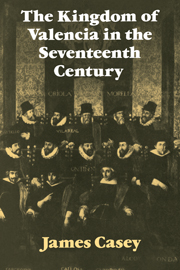Book contents
- Frontmatter
- Contents
- List of illustrations
- Preface
- Abbreviations
- A note on measures
- Map of the kingdom of Valencia
- Introduction
- 1 A long depopulation
- 2 Rich and poor
- 3 The decline of agriculture
- 4 Paying their way in the world
- 5 The seigneurial reaction
- 6 The bankruptcy of the senyors
- 7 The eclipse of the Popular Estate
- 8 The rule of the judges
- 9 Outlaws and rebels
- 10 The loyal kingdom
- Conclusion
- Appendix 1 Fluctuations in the tithes 1500–1700
- Appendix 2 The exploitation of a Valencian senyoriu: the marquesate of Lombay 1559–1700
- Appendix 3 Approaches to a budget for the Dukes of Gandía 1605–99
- Appendix 4 List of viceroys 1598–1700
- Bibliographical note
- Index
5 - The seigneurial reaction
Published online by Cambridge University Press: 03 May 2010
- Frontmatter
- Contents
- List of illustrations
- Preface
- Abbreviations
- A note on measures
- Map of the kingdom of Valencia
- Introduction
- 1 A long depopulation
- 2 Rich and poor
- 3 The decline of agriculture
- 4 Paying their way in the world
- 5 The seigneurial reaction
- 6 The bankruptcy of the senyors
- 7 The eclipse of the Popular Estate
- 8 The rule of the judges
- 9 Outlaws and rebels
- 10 The loyal kingdom
- Conclusion
- Appendix 1 Fluctuations in the tithes 1500–1700
- Appendix 2 The exploitation of a Valencian senyoriu: the marquesate of Lombay 1559–1700
- Appendix 3 Approaches to a budget for the Dukes of Gandía 1605–99
- Appendix 4 List of viceroys 1598–1700
- Bibliographical note
- Index
Summary
‘Sire’, the Valencian deputy Aparici told the Cortes of Cádiz in 1811, ‘the peasants of Valencia who live on seigneurial estates cannot be called peasants at all, for they are in truth mere slaves.’ Two hundred years after the event, Aparici had no hesitation in blaming the expulsion of the Moriscos for this state of affairs, ‘for it was then that the ills which our people are still suffering took root’. It is a commonplace of historical writing on the subject to castigate the resettlements after 1609 as unstable and unfair. In an age of economic decline the senyors reinforced their own position, turning Valencia into a hotbed of peasant unrest. Unable to pay the high rents introduced after the expulsion, the peasants took to the hills, providing recruits for the bandit gangs which were so active in the kingdom in the seventeenth century. Finally on 10 July 1693 the powder keg exploded, in what was probably the greatest jacquerie witnessed by Habsburg Spain, the so-called Second Germania. After years of litigation about rents, the peasants of the Duke of Gandía refused payment, their ringleaders were imprisoned, and a rustic army gathered to secure their release. By 13 July the royal governor of Játiva, at the head of the local militia, had succeeded in cornering the rebels in the mountains near Muro.
- Type
- Chapter
- Information
- The Kingdom of Valencia in the Seventeenth Century , pp. 101 - 126Publisher: Cambridge University PressPrint publication year: 1979



